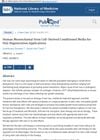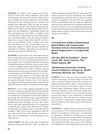Search
for
Sort by
Research
510-540 / 1000+ results
research Update on Platelet-Rich Plasma and Platelet-Rich Fibrin for Dermatologic Surgery: Addressing Knowns and Unknowns
PRP and PRF show promise for hair growth but need more research for consistent and safe use.

research Cyberspace Chat: Platelet Rich Plasma (PRP): Pseudoscience or Fact
The article concludes that PRP might help with hair loss, but more detailed research is necessary.

research Alopecia: A Review of Laser and Light Therapies
Lasers might help hair growth in some alopecia cases, but more research is needed to confirm their effectiveness and safety.
research Safety and Efficacy of ALRV5XR in Women with Androgenetic Alopecia or Telogen Effluvium: A Randomised, Double-Blinded, Placebo-Controlled Clinical Trial
ALRV5XR significantly improves hair density in women with hair loss and is well-tolerated.
research A Kaleidoscope of Keratin Gene Expression and the Mosaic of Its Regulatory Mechanisms
Keratin protein production in cells is controlled by a complex system that changes with cell type, health, and conditions like injury or cancer.
research Safety and Efficacy of ALRV5XR in Men with Androgenetic Alopecia: A Randomised, Double-Blinded, Placebo-Controlled Clinical Trial
ALRV5XR effectively increases hair density in men with androgenetic alopecia without adverse effects.

research Wound Healing Protects Against Chemotherapy-Induced Alopecia in Young Rats via Up-Regulating Interleukin-1β-Mediated Signaling
Wound healing can help prevent hair loss from chemotherapy in young rats by increasing interleukin-1β signaling.

research Chemotherapy-Induced Alopecia by Docetaxel: Prevalence, Treatment, and Prevention
Docetaxel often causes hair loss, with limited effective treatments and no cure for permanent hair loss.

research How Our Microbiome Influences the Pathogenesis of Alopecia Areata
Our microbiome may affect the development of the hair loss condition Alopecia Areata, but more research is needed to understand this relationship.
research Assessment and Treatment Outcomes of Persistent Radiation-Induced Alopecia in Cancer Patients
Persistent radiation-induced hair loss is dose-dependent, and treatments like topical minoxidil can be effective.
research An Open-Label Evaluator Blinded Study of the Efficacy and Safety of a New Nutritional Supplement in Androgenetic Alopecia: A Pilot Study
The supplement may help hair growth and is safe, but more research is needed.
research The Biological Role of Platelet Derivatives in Regenerative Aesthetics
Platelet-derived products help regenerate tissue and are used in various skin and hair treatments.

research Clinical Evaluation of Intradermal Platelet-Rich Plasma Administration Along with Oral Biotin Supplement for the Management of Androgenetic Alopecia in Adult Males: A Randomized Clinical Trial
Using platelet-rich plasma injections and biotin pills together significantly increases hair regrowth in men with hair loss.

research Photobiomodulation for the Management of Alopecia: Mechanisms of Action, Patient Selection, and Perspectives
Light therapy can stimulate hair growth and is more effective when started early, but more research is needed on its long-term effects and optimal use.

research Effectiveness of Platelet-Rich Plasma Therapy in Androgenic Alopecia: A Meta-Analysis
Platelet-Rich Plasma therapy significantly increases hair density in people with Androgenic Alopecia, and works better with more treatments per month and in younger patients.

research Prevention and Treatment of Chemotherapy-Induced Alopecia: What Is Available and What Is Coming?
Scalp cooling is the only FDA-approved method to prevent hair loss from chemotherapy, but other treatments like minoxidil and PRP are being tested.
research Platelet-Rich Plasma in Dermatology: New Insights on the Cellular Mechanism of Skin Repair and Regeneration
PRP helps skin heal, possibly through special cells called telocytes.

research An Update in the Management of Alopecia Areata
New treatments for alopecia areata show promise, but more research is needed to confirm their effectiveness.

research Pathophysiology of Burn Scars
Burn scars form abnormally due to changes in wound healing, and more research is needed to improve treatments.

research Correlation Between Sebum Level and Severity of Male Androgenetic Alopecia
Higher sebum levels are linked to more severe male baldness.
research Treatment of Androgenetic Alopecia: Current Guidance and Unmet Needs
More personalized and effective treatments for androgenetic alopecia are needed.

research Aging Skin and Non-Surgical Procedures: A Basic Science Overview
Non-surgical procedures can help reduce wrinkles and stimulate skin repair by understanding skin aging at the molecular level.

research Human Mesenchymal Stem Cell-Derived Conditioned Media for Hair Regeneration Applications
Stem cell therapy could be a promising alternative for hair regrowth with fewer side effects.

research Skin Stem Cells: At The Frontier Between The Laboratory And Clinical Practice. Part 1: Epidermal Stem Cells
Epidermal stem cells show promise for future dermatology treatments due to ongoing advancements.

research Keratinocytes and Adipose-Derived Mesenchymal Stem Cells: The Heir and the Spare to Regenerative Cellular Therapies for Difficult-to-Heal Skin Wounds
Keratinocytes and adipose-derived stem cells can effectively heal difficult skin wounds.

research Cutaneous Extramedullary Hematopoiesis: Implications in Human Disease and Treatment
Skin can produce blood cells, often due to disease, which might lead to new treatments for skin and blood conditions.

research Abstract 82
Fetal scalp cells have more regenerative genes than adult cells, and decellularized muscle matrix is better for muscle repair than commercial alternatives.

research Adipose-Derived Cellular and Cell-Derived Regenerative Therapies in Dermatology and Aesthetic Rejuvenation
Fat from the body can help improve hair growth and scars when used in skin treatments.

research Tp63-Expressing Adult Epithelial Stem Cells Cross Lineage Boundaries Revealing Latent Hairy Skin Competence
Adult stem cells with Tp63 can form hair and skin cells when placed in new skin, showing they have hidden abilities for skin repair.